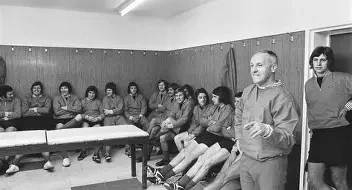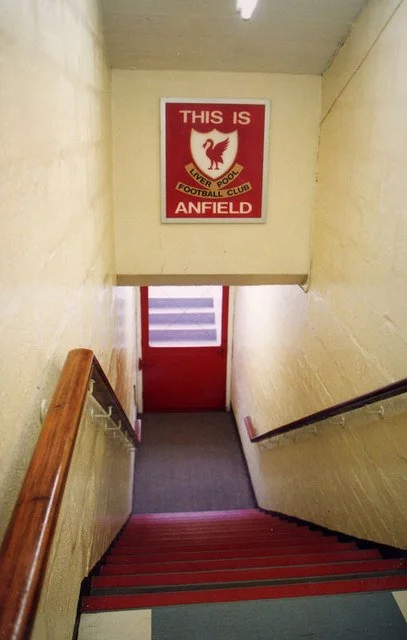Episode 1 - The Liverpool Way: Lessons in Culture from Anfield’s Inner Sanctum
The Culture 360 Blog & Podcast - The Liverpool Way with Chris McLoughlin - Episode 1
This Culture 360 blog post is a companion for the inaugural Culture 360 Podcast (Episode 1) - The Liverpool Way. For the full podcast and to dive deeper into the discussion, please find the YouTube channel link here: The Culture 360 Podcast (Episode 1) - The Liverpool Way. Alternatively, find the audio link here to listen or download:
There’s a phrase that echoes around football’s red half of Merseyside — “The Liverpool Way.” To some, it’s a romantic idea of free-flowing football, roaring crowds, and banners fluttering on the Kop. To others, it’s a system, a set of principles, and a relentless pursuit of excellence forged in a cramped little boot room at Anfield.
On a recent trip to St Helens, Merseyside in England, I sat down with an old school friend of 31 years — Chris McLoughlin, lifelong Red, seasoned sports journalist, and a man who’s spent a quarter of a century with a press pass to Liverpool FC’s inner sanctum. Over coffee and a microphone, we got under the skin of what makes this club tick — and why “The Liverpool Way” is a masterclass in organisational culture.
“Some people believe football is a matter of life and death, I am very disappointed with that attitude. I can assure you it is much, much more important than that.”
Winning Isn’t Everything… It’s the Only Thing
Bill Shankly’s famous line — “A professional football club exists to win trophies and nothing else” — isn’t just rhetoric. It’s a cultural blueprint. From the boardroom to the boot room, Liverpool’s ethos has been clear since the 1960s: winning is the point.
This isn’t the toxic “win at all costs” you see in dysfunctional outfits. It’s a sustainable winning culture — one that values the right people, in the right roles, at the right time. Chris tells stories of legendary figures like Bob Paisley and Joe Fagan, who could spot when a player’s best days were behind them and move them on, even if it broke hearts. Ruthless? Yes. Effective? Absolutely.
The Boot Room: Where Culture Was Bottled
Forget corporate strategy retreats in luxury resorts. Liverpool’s culture was built in a literal storage room for muddy footwear. The boot room was where the coaching staff sat on crates of Guinness, swapped ideas, analysed wins and losses, and quietly plotted the club’s dominance.
It was part tactical think tank, part social club, part espionage operation — opponents would be invited in for a post-match drink, and subtle questions would be asked. “John Barnes is quick, isn’t he?” wasn’t small talk — it was reconnaissance.
This was culture as muscle memory: a place where knowledge was shared, egos were left at the door, and a common purpose united everyone.
No Big Egos, No Dickheads
One of the clearest lessons from Liverpool’s success: talent isn’t enough. Character counts.
The club has long operated an unwritten “no dickheads” policy — an approach many high-performing organisations could adopt tomorrow. If you can’t buy into the team-first ethos, you’re out. That applies whether you’re Mario Balotelli or the matchday programme editor.
Jurgen Klopp mastered this in the modern era, cultivating a squad where even fringe players felt vital. He convinced his bench that they could win games — and they did, repeatedly.
The 12th Man: Harnessing the Crowd
Klopp understood something that all great leaders know — culture isn’t confined to the payroll. He made Anfield a fortress not just by coaching players, but by re-engaging the fans.
One of his earliest acts was celebrating a late equaliser against lowly West Brom with the entire squad in front of the Kop. Critics scoffed. The fans didn’t. That moment said: We’re in this together.
Since then, Liverpool have turned home games into collective experiences — where the energy flows both ways. The players feed the fans, the fans feed the players, and opponents wilt in the noise.
Traditions, Rituals, and Symbols
Culture lives in the small things. The red banners on the Kop. The “This is Anfield” sign you only touch once you’ve earned it. The songs that become anthems, not marketing slogans.
Liverpool fans even police their own traditions — the tongue-in-cheek “Keep Flags Scouse” campaign kept the Kop a sea of red and white, not St George’s crosses. It’s not about where you’re from; it’s about where you are.
Community as the Bedrock
If “winning” is the headline, “community” is the foundation. Liverpool’s bond with its fans — and the city itself — is deeper than commerce or branding. From the shared grief of Hillsborough to the spontaneous joy of Champions League parades, the club and its people move as one.
Chris calls it “supporters, not spectators” — and that mindset keeps the culture alive, no matter who owns the club, manages the team, or wears the shirt.
Five Culture Lessons Any Organisation Can Steal from Liverpool FC
Clarity of Purpose – Everyone is clear about the goal. At Liverpool, it’s winning trophies. In your business, it should be just as clear.
Clarity of Purpose – Everyone knows the goal. At Liverpool, it’s winning trophies. In your business, it should be just as clear.
Hire for Culture Fit, Not Just Skill – Talent without humility is a liability.
Protect and Honour Traditions – Rituals reinforce belonging and identity.
Empower from the Bottom Up – The fans (or front-line employees) keep the culture alive. Leaders should listen.
Create Fortress Moments – Make your people feel unstoppable together, whether in a stadium or a strategy meeting.
To dive deeper into this discussion, please check out The Culture 360 Podcast Episode 1 - The Liverpool Way with Chris McLoughlin here: The Culture 360 Podcast (Episode 1) - The Liverpool Way.
Chris McLoughlin (Left), Senior Writer at Reach Sport and responsible for the Liverpool FC match day programme and The Walk On magazine, was our honoured and inaugural guest for The Culture 360 Podcast (Episode 1) - The Liverpool Way.







